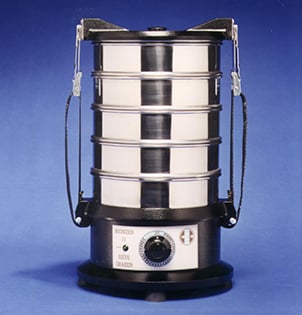Read More
Topics: Sieve Shakers, "Ask Art", Sonic Sifter, Agglomeration, Particle Size Analysis, Sieve Testing, Sieves, Sieving Process, Sieve Analysis, Quiet sieve shakers, sieve shaker
Visitors to our web pages often arrive with the question, “What is the Function of a Sieve Shaker?”
Topics: Sieve Shakers, "Ask Art", Sonic Sifter, Agglomeration, Particle Size Analysis, Sieve Testing, Sieves, Sieving Process, Sieve Analysis, Quiet sieve shakers, sieve shaker
We get the same two questions almost every week about the CSC Bostwick Consistometer:
1) What angle do I use to set it up?
2) How do I level the Consistometer?
Principle of Operation
The principle of the CSC Bostwick Consistometer is based on the slump cone. In this procedure, a cone is filled with the material to be tested. It is then set on a level surface with the open area facing downward. The cone is pulled away and after a fixed time, the amount that the material slumped is measured. The thicker the material, the less slumping occurs.
Topics: "Ask Art", Bostwick Consistometer, Consistency, Liquid Properties, Bostwick, consistency vs viscosity
Topics: "Ask Art", Newtonian Fluid, Measure Viscosity, Viscometers, Viscosity

Sieve testing, as I have stated many times, is the Cinderella of particle size analysis because it delivers more value than expected from something that’s so easy to use and relatively inexpensive. However, the problem with standard sieving techniques using wire mesh sieves is that they begin to exhibit accuracy problems in the lower micron sizes.
Topics: Sieve Shakers, "Ask Art", Sonic Sifter, Micron-Sized Particles, Particle Size Analysis, Sieve Testing, Sieving Process
Automatic digital tensiometers are expensive - three to four times more so than a high-precision manual tensiometer. We hope to clearly depict when an automatic digital tensiometer is not merely nice to have, but essential.
Topics: Wilhelmy Plates, Automatic Digital Tensiometer, Automatic Surface Tension Measurment, "Ask Art", duNouy Rings, Tensiometer, Surface Tension Measurement, Surface Tension, Liquid Properties
What Can I Use To Get The Moisture Content In My Product?
Posted by Art Gatenby on Oct 3, 2013 5:36:00 PM
A question we get a lot is:
“How do I determine the moisture in my product?"
Of course, the answer is often “it depends”, and the method does depend on the chemical and physical composition of the product. There are several methods used to determine moisture content: Loss-on-Drying (also known as Weight Loss), Karl Fischer, NIR, and Radio Frequency.
Topics: "Ask Art", Moisture Analysis, Karl Fischer, CSC Digital Moisture Balance, Loss-On-Drying, Moisture




